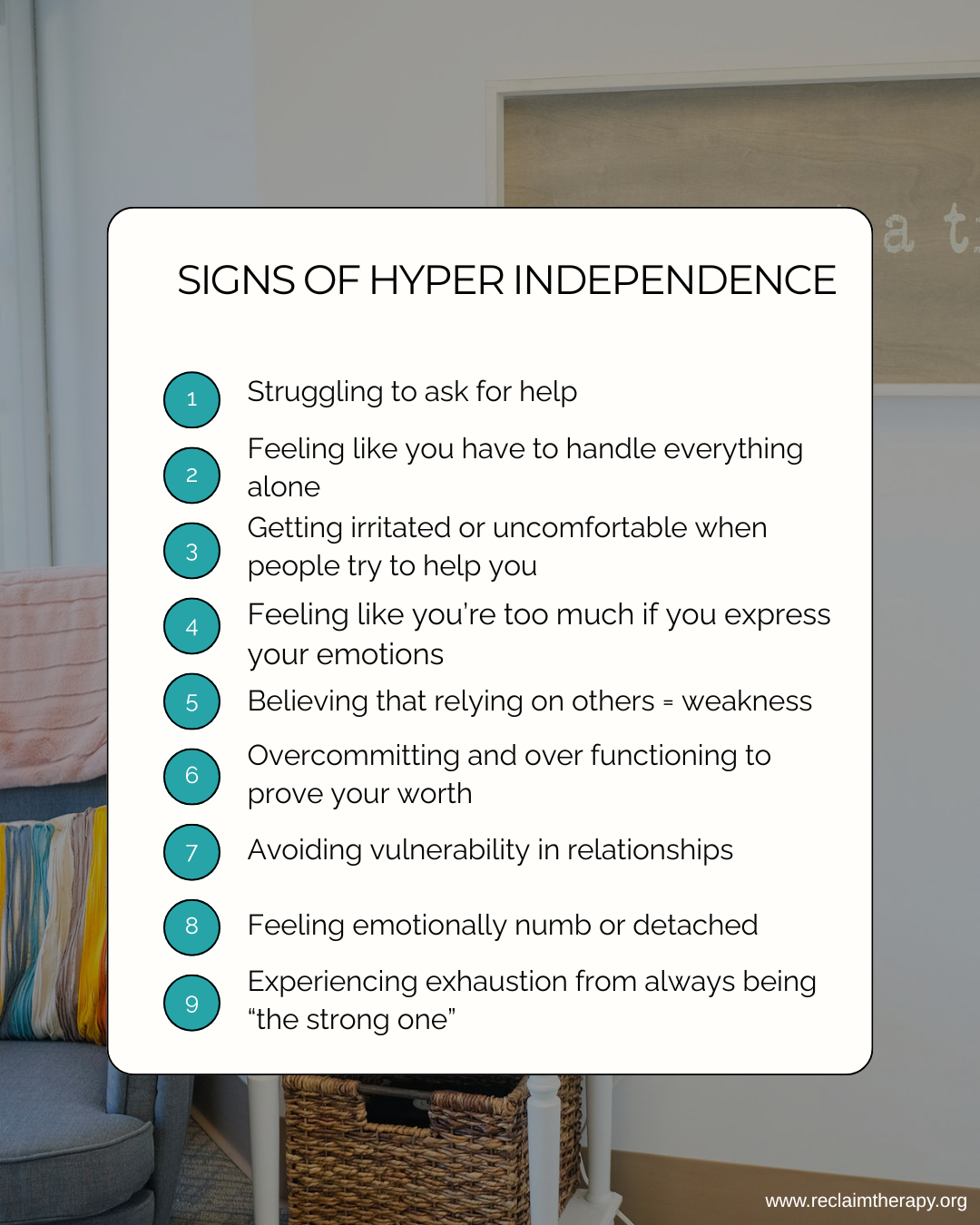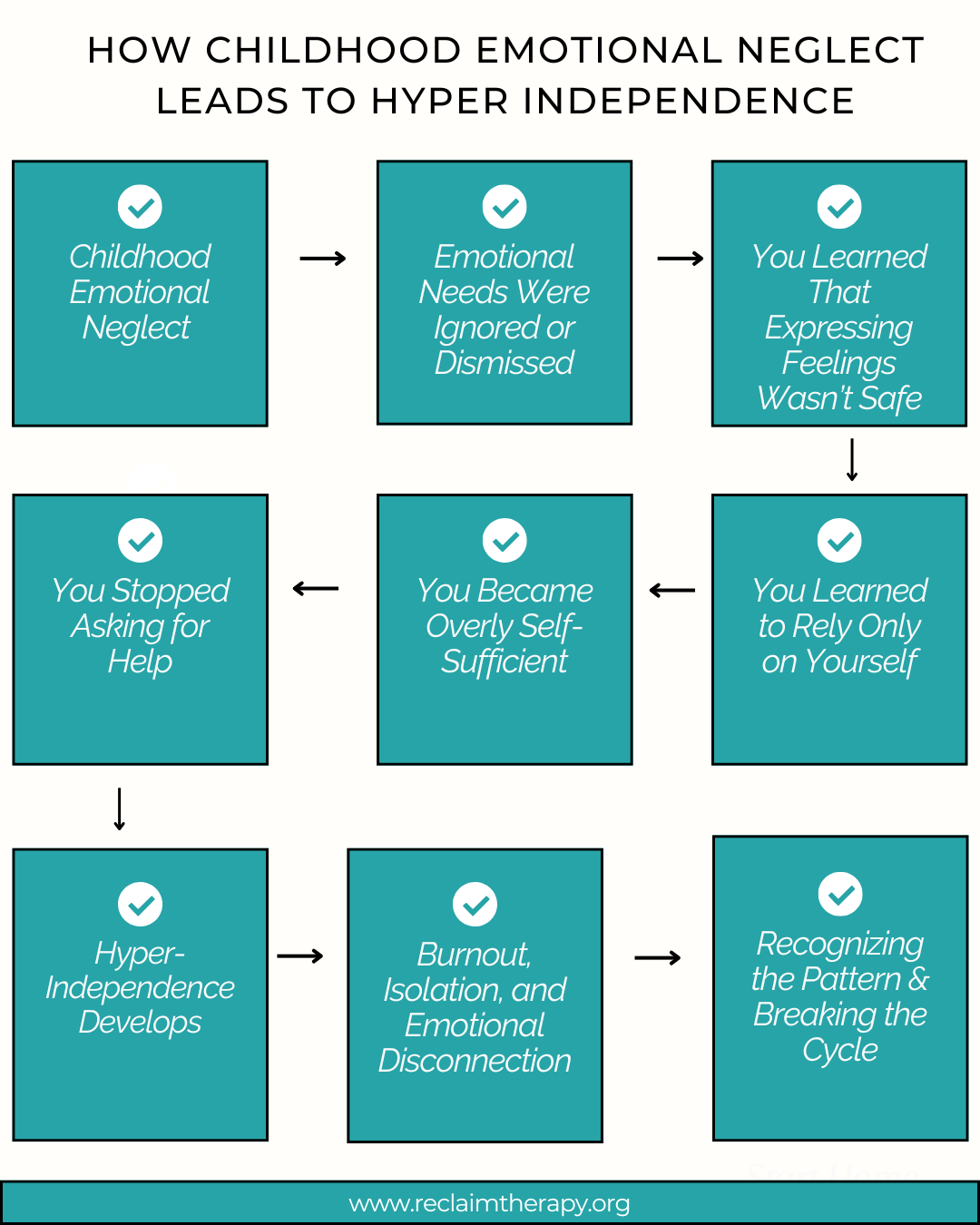The Trap of Hyper Independence and and How it Affects Our Relationships
Why Asking for Help for Hyper Independence and Childhood Emotional Neglect Can Feel Impossible
If you grew up feeling like you couldn’t rely on anyone, it makes sense that as an adult, you might operate like you don’t need anyone.
Hyper-independence, being so self-reliant that you struggle to ask for or receive help, often gets framed as a strength.
People admire it.
They call you “capable,” “driven,” and “strong.”
These signs of hyper independence can affect our relationships and all aspects of our lives.
And on the surface, maybe you agree. You’re the one who gets things done. The one people depend on. The one who doesn’t need anything from anyone.
But under all that self-sufficiency, there’s often exhaustion. Loneliness. Maybe even resentment.
And if we dig deep enough, probably fear.
Fear of needing something you were taught you couldn’t have.
If this sounds familiar, let’s talk about what hyper-independence really is, how it connects to childhood emotional neglect, and what healing might look like.
What Is Hyper Independence?
Hyper-independence isn’t just being "independent."
It’s a survival strategy. One often rooted in trauma. It’s when self-reliance becomes the only option you trust.
Signs of hyper independence might include:
Struggling to ask for help, even when you’re overwhelmed
Feeling uncomfortable (or even irritated) when people offer support
Believing that needing help means you’re weak or failing
Avoiding vulnerability in relationships because it feels too risky
Overcommitting and overfunctioning, even when you’re exhausted
Feeling like you can only rely on yourself
If this is you, I want you to hear this: It’s not your fault. Hyper-independence doesn’t come out of nowhere. It’s a learned response to unmet needs.
Is Hyper Independence a Trauma Response?
The Connection to Childhood Emotional Neglect
When we think of childhood trauma, we often think of what happened. But sometimes, trauma is about what didn’t happen.
Childhood emotional neglec happens when a child’s emotional needs aren’t met consistently. This doesn’t always mean outright abuse.
Sometimes, hyper independence trauma looks like:
Parents who were physically present but emotionally unavailable
Growing up in a “good” family where emotions weren’t talked about
Feeling like you had to be the “easy” or “self-sufficient” child
Getting shut down, dismissed, or ignored when expressing feelings
When your emotions weren’t met with care, comfort, or attunement, you likely learned that relying on others wasn’t safe or effective.
You adapted.
You became the strong one, the one who doesn’t ask for anything.
Because asking meant risking rejection, disappointment, or shame.
And now?
Even when help is available, it might not feel available. There are different ways this extreme self reliance can show up for women and in relationships. Let’s explore.
Hyper Independence in Women
For many women—especially those who experienced childhood emotional neglect—hyper independence isn’t just a personality trait. It’s a learned survival strategy. When emotional needs were consistently unmet in childhood, independence became a way to stay safe, avoid disappointment, and manage without the vulnerability of asking for help.
Hyper independence in women is often praised by others. You may be called “strong,” “capable,” or “unstoppable.” But behind that strength can be a lifetime of unspoken emotional labor, chronic burnout, and quiet loneliness.
You might find yourself exhausted from doing everything alone, yet still feel uncomfortable accepting support. That discomfort isn’t weakness—it’s a reflection of early experiences where asking for help wasn’t met with care, but with dismissal, criticism, or emotional absence.
While there's no definitive evidence suggesting women are inherently more prone to hyper-independence than men, some studies suggest that women may be more sensitive to interpersonal meanings and societal expectations regarding intimacy, while men may place greater importance on group memberships and collectives.
This kind of emotional conditioning can make receiving help feel unsafe, even when it’s offered. Healing begins with recognizing that this level of self-reliance was once necessary, but may no longer be serving you in the present.
Hyper Independence in Relationships
Hyper independence can have a profound impact on relationships. When you’ve learned to rely only on yourself, closeness may feel threatening rather than comforting. You might struggle to be vulnerable, avoid leaning on your partner during hard times, or feel uneasy when someone offers to care for you.
This can lead to emotional distance, misunderstandings, or feelings of isolation—even in committed partnerships.
In hyper independent relationships, it’s common to:
Avoid sharing emotional needs out of fear of being a burden
Over-function (doing more than your share) to avoid “owing” anyone anything
Feel resentment when your partner needs support, because you never allowed yourself the same
Struggle to fully trust or depend on others, even when they’ve proven safe
But relationships thrive on mutual care and emotional intimacy. Healing hyper independence in relationships doesn’t mean becoming dependent—it means allowing yourself to be interdependent. To give and receive, to ask and be met with support.
Therapy can help create a safe space to explore these patterns and gently build new ways of relating.
The Cost of Hyper-Independence
Hyper-independence might have helped you survive your childhood, but in adulthood, it can lead to:
Chronic stress and burnout from doing everything yourself
Difficulty forming deep, trusting relationships because vulnerability feels unsafe
Feeling isolated, even when surrounded by people
Struggles with self-compassion- you may be harder on yourself than anyone else
Resentment toward others who seem to expect less from themselves
If you relate, you’re not broken, you’ve spent a lifetime protecting yourself. But healing means recognizing that protection isn’t always needed anymore.
Hyper Independence Treatment: How to Start Healing from this Childhood Emotional Neglect Trauma
You don’t have to abandon your independence to heal. Instead, it’s about expanding your capacity for connection, trust, and support. Here’s where to start:
1. Name It Without Shame
Like we’ve talked about, hyper-independence isn’t a personality trait, it’s a learned response.
Start by noticing when you default to “I got it” mode.
Instead of criticizing yourself, try:
“I wonder why I feel the need to handle this alone?”
“What would happen if I let someone support me?”
2. Practice Small Acts of Receiving
Healing doesn’t start with major life changes, it starts with small shifts.
If asking for help feels impossible, try:
Accepting a friend’s offer to help, even if it’s something small
Letting yourself receive a compliment instead of deflecting it
Noticing when someone supports you (emotionally or practically) and allowing it
3. Challenge the Belief That ‘Needing’ Equals ‘Weakness’
If you equate needing support with failure, ask yourself: Who taught me that?
Because the truth is, human beings are wired for connection. Accepting support doesn’t make you weak.
4. Let Safe People In (Slowly)
If vulnerability feels overwhelming, don’t force it.
Start with people who have already shown up for you consistently.
Let yourself share small things and notice how it feels to be met with care.
5. Instead of Avoiding Therapy, Work with a Therapist Who Gets It
Unlearning hyper independence often requires re-learning how to feel safe in relationships. A trauma-informed therapist can help you explore these patterns in a way that feels supportive and manageable.
If you grew up feeling like you had to handle everything alone, it makes sense that you still operate that way.
But, you don’t have to take this self reliance to the extreme.
Your independence is a strength, but so is your ability to connect, receive, and be supported.
Healing doesn’t mean giving up who you are; it means expanding your options.
So, if you’re reading this and thinking, yeah, but I really am fine on my own, I hear you. I have been there.
And, I gently challenge you to consider: what if you didn’t have to be?
You are not a burden. You are not too much. And you don’t have to do this alone.
Looking for a trauma therapist to support you?
The Reclaim Therapy Team specializes in working with people healing from childhood emotional neglect, complex trauma, and disordered eating in our Horsham, PA offices and across the state of Pennsylvania via online therapy.
We are passionate about helping people reclaim their lives from the image of trauma, and believe that healing and recovery is possible.
If you’re ready to explore this work with a therapist who doesn’t just talk the talk, but walks the walk, we’d love to connect with you.
🧡,
Reclaim Therapy is a therapy practice in Horsham, PA that specializes in providing trauma therapy and EMDR therapy for CPTSD, childhood emotional neglect and eating disorders.
Our specialized trauma therapists are passionate about support people to heal from their past so that they can live, unapologetically- on their own terms, in the here and now. If you’re looking to get started with therapy in Pennsylvania, contact us today!




